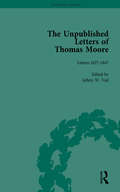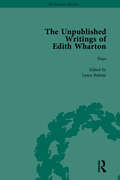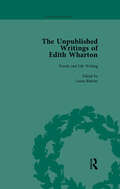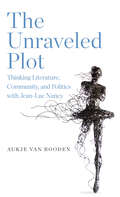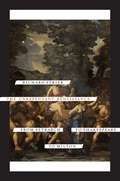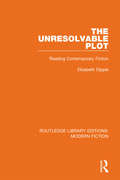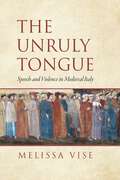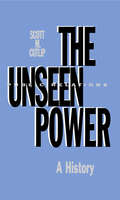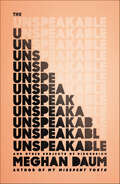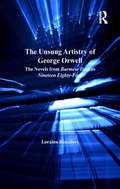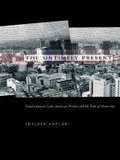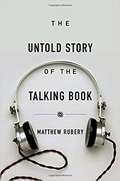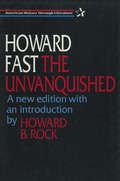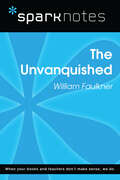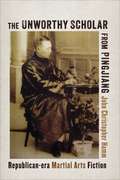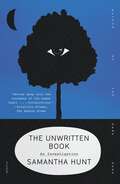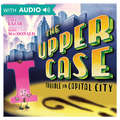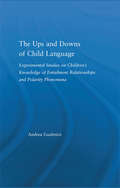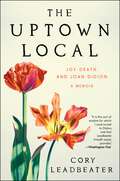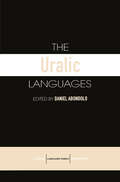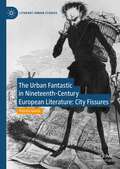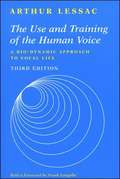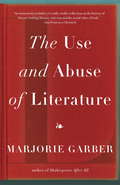- Table View
- List View
The Unpublished Letters of Thomas Moore Vol 2
by Jeffery W VailThomas Moore was one of the most prominent authors of the early 19th century. This collection presents over 600 previously unpublished letters from numerous libraries, archives and other sources worldwide. Vail's extensively-annotated edition will make available a treasure trove of material which will prove invaluable to any Romantic scholar.
The Unpublished Writings of Edith Wharton Vol 1
by Laura RattrayDuring her lifetime, Edith Wharton was America's most popular and prolific writer. This book presents the unpublished writings of a canonical author, along with three stage-plays that open up a different field of Wharton studies. It also includes a general introduction, volume introductions, textual variants, headnotes and endnotes.
The Unpublished Writings of Edith Wharton Vol 2
by Laura RattrayDuring her lifetime, Edith Wharton was America's most popular and prolific writer. This book presents the unpublished writings of a canonical author, along with three stage-plays that open up a different field of Wharton studies. It also includes a general introduction, volume introductions, textual variants, headnotes and endnotes.
The Unraveled Plot: Thinking Literature, Community, and Politics with Jean-Luc Nancy (SUNY series in Contemporary French Thought)
by Aukje van RoodenExplores the connection between Jean-Luc Nancy's political works on community and his works on art and literature, thus providing not only a comprehensive introduction into Nancy’s work but also a broader examination of the social and political role of literature.What is the connection between the work of community and the work of literature? And in what way is literature implied in Jean-Luc Nancy's "inoperative" community? The Unraveled Plot investigates the relation between two domains that have only separately been addressed in the reception of Nancy's work: his political works on community on the one hand and his works on art and literature on the other. Lucidly traversing Nancy's entire oeuvre, Aukje van Rooden offers not only a comprehensive introduction into Nancy’s work but also a much broader reflection on the social and political role of literature. Situating Nancy's thought within a larger philosophical tradition leading from German Romanticism to contemporary social and political theory, she offers new insights, with and beyond Nancy, on the forming of communities and how literature can play a role.
The Unrepentant Renaissance
by Richard StrierWho during the Renaissance could have dissented from the values of reason and restraint, patience and humility, rejection of the worldly and the physical? These widely articulated values were part of the inherited Christian tradition and were reinforced by key elements in the Renaissance, especially the revival of Stoicism and Platonism. This book is devoted to those who did dissent from them. Richard Strier reveals that many long-recognized major texts did question the most traditional values and uncovers a Renaissance far more bumptious and affirmative than much recent scholarship has allowed. The Unrepentant Renaissance counters the prevalent view of the period as dominated by the regulation of bodies and passions, aiming to reclaim the Renaissance as an era happily churning with surprising, worldly, and self-assertive energies. Reviving the perspective of Jacob Burckhardt and Nietzsche, Strier provides fresh and uninhibited readings of texts by Petrarch, More, Shakespeare, Ignatius Loyola, Montaigne, Descartes, and Milton. Strier's lively argument will stir debate throughout the field of Renaissance studies.
The Unrepentant Renaissance: From Petrarch to Shakespeare to Milton
by Richard StrierWho during the Renaissance could have dissented from the values of reason and restraint, patience and humility, rejection of the worldly and the physical? These widely articulated values were part of the inherited Christian tradition and were reinforced by key elements in the Renaissance, especially the revival of Stoicism and Platonism. This book is devoted to those who did dissent from them. Richard Strier reveals that many long-recognized major texts did question the most traditional values and uncovers a Renaissance far more bumptious and affirmative than much recent scholarship has allowed.The Unrepentant Renaissance counters the prevalent view of the period as dominated by the regulation of bodies and passions, aiming to reclaim the Renaissance as an era happily churning with surprising, worldly, and self-assertive energies. Reviving the perspective of Jacob Burckhardt and Nietzsche, Strier provides fresh and uninhibited readings of texts by Petrarch, More, Shakespeare, Ignatius Loyola, Montaigne, Descartes, and Milton. Strier’s lively argument will stir debate throughout the field of Renaissance studies.
The Unresolvable Plot: Reading Contemporary Fiction (Routledge Library Editions: Modern Fiction #13)
by Elizabeth DippleOriginally published in 1988, the last few decades had seen the appearance of some brilliant and complex new kinds of fiction. The ambitious experiments of writers such as Greene, Garcia Márquez, Borges, Nabakov, Calvino, Beckett, Eco, Spark, Hoban, Murdoch, Bellow, Ozick, and Lessing among others had all proved the vitality of contemporary fiction in discovering exciting new forms and styles. Yet because of the difficulty of many of the texts, contemporary fiction as a genre had acquired an undeservedly unpopular reputation among students and other readers. In a very real way, the reader had become nervous rather than confident in the face of a literature that in fact is more aware of and generous to that reader than earlier and more apparently accessible literature ever managed to be. And the new fiction’s seeming remoteness from the reader is exaggerated, in a sense, by the critical academic response at the time, which tended to obscure the texts themselves behind the many aesthetic and cultural theories which had sprung up in the study of fictionalizing or narrativity in general. Elizabeth Dipple is anxious to dispel readers’ fears about these texts. She has chosen an international list of major writers of the time and presents a detailed discussion of each. Beginning each chapter with a brief explanation of the context in which each fictionist is to be examined, she then concentrates on an analysis of key texts, aiming always to look beyond jargon and theory back to the sources themselves. Professor Dipple’s purpose was to convey to the reader some of her own admiration and enthusiasm for contemporary fiction and to persuade him or her to take a fresh look at a group of writers who were producing what she felt would surely be seen by future generations as among the most sophisticated and accomplished fiction of our time.
The Unruly Tongue: Speech and Violence in Medieval Italy (The Middle Ages Series)
by Melissa ViseA cultural history of speech in medieval ItalyThe Unruly Tongue, a cultural history of speech in medieval Italy, offers a new account of how the power of words changed in Western thought. Despite the association of freedom of speech with the political revolutions of the eighteenth century that ushered in the era of modern democracies, historian Melissa Vise locates the history of the repression of speech not in Europe’s monarchies but rather in Italy’s republics. Exploring the cultural process through which science and medicine, politics, law, literature, and theology together informed a new political ethics of speech, Vise uncovers the formation of a moral code where the regulation of the tongue became an integral component of republican values in medieval Europe.The medieval citizens of Italy’s republics understood themselves to be wholly subject to the power of words not because they lived in an age of persecution or doctrinal rigidity, but because words had furnished the grounds for their political freedom. Speech-making was the means for speaking the republic itself into existence against the opposition of aristocracy, empire, and papacy. But because words had power, they could also be deployed as weapons. Speech contained the potential for violence and presented a threat to political and social order, and thus needed to be controlled. Vise shows how the laws that governed and curtailed speech in medieval Italy represented broader cultural understandings of human susceptibility to speech. Tracing anthropologies of speech from religious to political discourse, from civic courts to ecclesiastical courts, from medical texts to the works of Dante and Boccaccio, The Unruly Tongue demonstrates that the thirteenth century marked a major shift in how people perceived the power, and the threat, of speech: a change in thinking about “what words do.”
The Unseen Power: A History (Routledge Communication Series)
by Scott M. CutlipBased largely on primary sources, this book presents the first detailed history of public relations from 1900 through the 1960s. The author utilized the personal papers of John Price Jones, Ivy L. Lee, Harry Bruno, William Baldwin III, John W. Hill, Earl Newsom as well as extensive interviews -- conducted by the author himself -- with Pendleton Dudley, T.J. Ross, Edward L. Bernays, Harry Bruno, William Baldwin, and more. Consequently, the book provides practitioners, scholars, and students with a realistic inside view of the way public relations has developed and been practiced in the United States since its beginnings in mid-1900. For example, the book tells how: * President Roosevelt's reforms of the Square Deal brought the first publicity agencies to the nation's capital. * Edward L. Bernays, Ivy Lee, and Albert Lasker made it socially acceptable for women to smoke in the 1920s. * William Baldwin III saved the now traditional Macy's Thanksgiving Day parade in its infancy. * Ben Sonnenberg took Pepperidge Farm bread from a small town Connecticut bakery to the nation's supermarket shelves -- and made millions doing it. * Two Atlanta publicists, Edward Clark and Bessie Tyler, took a defunct Atlanta bottle club, the Ku Klux Klan, in 1920 and boomed it into a hate organization of three million members in three years, and made themselves rich in the process. * Earl Newsom failed to turn mighty General Motors around when it was besieged by Ralph Nader and Congressional advocates of auto safety. This book documents the tremendous role public relations practitioners play in our nation's economic, social, and political affairs -- a role that goes generally unseen and unobserved by the average citizen whose life is affected in so many ways by the some 150,000 public relations practitioners.
The Unsociable Sociability of Women’s Lifewriting
by Louise D’arcens Anne CollettWhen Christine de Pizan described herself in 1405 as 'femme a part', she expressed a divided sense of identity that has echoed throughout women's life-writing up to the present day. In these three words Christine captures the uneasy relationship between the female self that is a part of communities and the self that stands apart from them. Christine anticipates Kant's concept of unsociable sociability in which 'an inclination to associate with others' weighs against 'a strong propensity to isolate one]self from others'. It is this complex sense of self seeking to belong yet yearning for solitude and distinction that is at the heart of this volume's exploration of women's life writing. Offering a cross-cultural and cross-historical emphasis, it makes a distinctive contribution to current debates on women's life-writing. Its emphasis on unsociable sociability offers a timely, provocative response to the established notion of the female self as a 'relational subject'. "
The Unspeakable: And Other Subjects of Discussion
by Meghan DaumA master of the personal essay candidly explores love, death, and the counterfeit rituals of American life in this "brave, funny compendium" (Slate)Nearly fifteen years after her debut collection, My Misspent Youth, captured the ambitions and anxieties of a generation, Meghan Daum returns to the personal essay with The Unspeakable, a powerful collection of ten new works.Where her previous collection explores what it is to be a struggling twenty-something urban dweller with an overdrawn bank account and oversized ambition, The Unspeakable contends with parental death, the decision not to have children, and more-a new set of challenges tackled by a writer at her best, investigated in the same uncompromising voice that made Daum one of the most engaging thinkers writing today.In The Unspeakable, Daum pushes back against the false sentimentality and shrink-wrapped platitudes that surround so much of the contemporary American experience. But Daum also operates in a comic register. With perfect precision, she reveals the absurdities of the New Age search for the "Best Possible Experience," champions the merits of cream-of-mushroom-soup casserole, and gleefully recounts a quintessential "only-in-L.A." story of playing charades at a famous person's home.Combining the piercing insight of Joan Didion with humor reminiscent of Nora Ephron's, Daum dissects our culture's most dangerous illusions while retaining her own joy and compassion. Through it all, she dramatizes the search for an authentic self in a world where achieving an identity is never simple and never complete.
The Unsung Artistry of George Orwell: The Novels from Burmese Days to Nineteen Eighty-Four
by Loraine SaundersIn a timely and radically new reappraisal of George Orwell's fiction, Loraine Saunders reads Orwell's novels as tales of successful emancipation rather than as chronicles of failure. Contending that Orwell's novels have been undervalued as works of art, she offers extensive textual analysis to reveal an author who is in far more control of his prose than has been appreciated. Persuasively demonstrating that Orwell's novels of the 1930s such as A Clergyman's Daughter and Keep the Aspidistra Flying are no less important as literature than Animal Farm and Nineteen Eighty-Four, Saunders argues they have been victims of a critical tradition whose practitioners have misunderstood Orwell's narrative style, failed to appreciate Orwell's political stance, and were predisposed to find little merit in Orwell's novels. Saunders devotes significant attention to George Gissing's influence on Orwell, particularly with regard to his representations of women. She also examines Orwell's socialism in the context of the political climate of the 1930s, finding that Orwell, in his successful negotiation of the fine balance between art and propaganda, had much more in common with Charlie Chaplin than with writers like Stephen Spender or W. H. Auden. As a result of Saunders's detailed and accessible analysis, which illuminates how Orwell harmonized allegory with documentary, polyphonic voice with monophonic, and elegy with comedy, Orwell's contributions to the genre of political fiction are finally recognized.
The Untimely Present: Postdictatorial Latin American Fiction and the Task of Mourning
by Idelber AvelarThe Untimely Present examines the fiction produced in the aftermath of the recent Latin American dictatorships, particularly those in Argentina, Brazil, and Chile. Idelber Avelar argues that through their legacy of social trauma and obliteration of history, these military regimes gave rise to unique and revealing practices of mourning that pervade the literature of this region. The theory of postdictatorial writing developed here is informed by a rereading of the links between mourning and mimesis in Plato, Nietzsche's notion of the untimely, Benjamin's theory of allegory, and psychoanalytic / deconstructive conceptions of mourning.Avelar starts by offering new readings of works produced before the dictatorship era, in what is often considered the boom of Latin American fiction. Distancing himself from previous celebratory interpretations, he understands the boom as a manifestation of mourning for literature's declining aura. Against this background, Avelar offers a reassessment of testimonial forms, social scientific theories of authoritarianism, current transformations undergone by the university, and an analysis of a number of novels by some of today's foremost Latin American writers--such as Ricardo Piglia, Silviano Santiago, Diamela Eltit, João Gilberto Noll, and Tununa Mercado. Avelar shows how the 'untimely' quality of these narratives is related to the position of literature itself, a mode of expression threatened with obsolescence.This book will appeal to scholars and students of Latin American literature and politics, cultural studies, and comparative literature, as well as to all those interested in the role of literature in postmodernity.
The Untold Story of the Talking Book
by Matthew RuberyHistories of the book often move straight from the codex to the digital screen. Left out is nearly 150 years of audio recordings. Matthew Rubery uncovers this story, from Edison to today’s billion-dollar audiobook industry, and breaks from convention by treating audiobooks as a distinctive art form that has profoundly influenced the way we read.
The Unvanquished
by Howard FastOriginally published in 1942, The Unvanquished is the story of the Continental Army and George Washington in the desperate early months when the American Revolution faced defeat and disintegration. The book begins with the retreat across Manhattan's East River that saved the Continental Army after the Battle of Long Island. It ends with Washington's recrossing of the Delaware in the daring 1776 Christmas Eve raid on the Hessian camp at Trenton.
The Unvanquished (SparkNotes Literature Guide Series)
by SparkNotesThe Unvanquished (SparkNotes Literature Guide) by William Faulkner Making the reading experience fun! Created by Harvard students for students everywhere, SparkNotes is a new breed of study guide: smarter, better, faster. Geared to what today's students need to know, SparkNotes provides: *Chapter-by-chapter analysis *Explanations of key themes, motifs, and symbols *A review quiz and essay topicsLively and accessible, these guides are perfect for late-night studying and writing papers
The Unworthy Scholar from Pingjiang: Republican-Era Martial Arts Fiction
by John Christopher HammXiang Kairan, who wrote under the pen name “the Unworthy Scholar from Pingjiang,” is remembered as the father of modern Chinese martial arts fiction, one of the most distinctive forms of twentieth-century Chinese culture and the inspiration for China’s globally popular martial arts cinema. In this book, John Christopher Hamm shows how Xiang Kairan’s work and career offer a new lens on the transformations of fiction and popular culture in early-twentieth-century China.The Unworthy Scholar from Pingjiang situates Xiang Kairan’s career in the larger contexts of Republican-era China’s publishing industry, literary debates, and political and social history. At a time when writers associated with the New Culture movement promoted an aggressively modernizing vision of literature, Xiang Kairan consciously cultivated his debt to homegrown narrative traditions. Through careful readings of Xiang Kairan’s work, Hamm demonstrates that his writings, far from being the formally fossilized and ideologically regressive relics their critics denounced, represent a creative engagement with contemporary social and political currents and the demands and possibilities of an emerging cultural marketplace. Hamm takes martial arts fiction beyond the confines of genre studies to situate it within a broader reexamination of Chinese literary modernity. The first monograph on Xiang Kairan’s fiction in any language, The Unworthy Scholar from Pingjiang rewrites the history of early-twentieth-century Chinese literature from the standpoints of genre fiction and commercial publishing.
The Unwritten Book: An Investigation
by Samantha Hunt“A beautiful, inventive collection shot through with wildness and grace.” —Maggie Nelson, author of On FreedomFrom Samantha Hunt, the award-winning author of The Dark Dark, comes The Unwritten Book, her first work of nonfiction, a genre-bending creation that explores the importance of books, the idea of haunting, and messages from beyond I carry each book I’ve ever read with me, just as I carry my dead—those things that aren’t really there, those things that shape everything I am. A genre-bending work of nonfiction, Samantha Hunt’s The Unwritten Book explores ghosts, ghost stories, and haunting, in the broadest sense of each. What is it to be haunted, to be a ghost, to die, to live, to read? Books are ghosts; reading is communion with the dead. Alcohol is a way of communing, too, as well as a way of dying. Each chapter gathers subjects that haunt: dead people, the forest, the towering library of all those books we’ll never have time to read or write. Hunt, like a mad crossword puzzler, looks for patterns and clues. Through literary criticism, history, family history, and memoir, inspired by W. G. Sebald, James Joyce, Ali Smith, Toni Morrison, William Faulkner, and many others, Hunt explores motherhood, hoarding, legacies of addiction, grief, how we insulate ourselves from the past, how we misinterpret the world. Nestled within her inquiry is a very special ghost book, an incomplete manuscript about people who can fly without wings, written by her father and found in his desk just days after he died. What secret messages might his work reveal? What wisdom might she distill from its unfinished pages? Hunt conveys a vivid and grateful life, one that comes from living closer to the dead and shedding fear for wonder. The Unwritten Book revels in the randomness, connectivity, and magic of everyday existence. And at its heart is the immense weight of love.
The Upper Case: Trouble in Capital City (Private I)
by Tara LazarJust when Private I thinks all is calm-now that he's cracked the case of 7 Ate 9-Question Mark storms into the office.Mark is worried. All the uppercase letters are M-I-S-S-I-N-G! But that's absurd. This is CAPITAL City!Private I is the last letter standing. Will he solve his BIGGEST mystery yet, the UPPER CASE, before it's too late?!Filled with the same humor, wit, and quirkiness of the hit 7 Ate 9: The Untold Story, comes another laugh-out-loud whodunit.
The Ups and Downs of Child Language: Experimental Studies on Children's Knowledge of Entailment Relationships and Polarity Phenomena (Outstanding Dissertations in Linguistics)
by Andrea GualminiThe new experimental evidence presented in The Ups and Downs of Child Language shows that it is possible to extend research on child language to children's semantic competence, adopting the same theoretical framework that has proven useful to the study of children's syntactic competence. Andrea Gualmini investigates the role of entailment relations for child language in a series of interconnected experiments assessing children's negation and their interpretation of words like or, every, and some. Comparing his study to other models of language acquisition and characterizing the observed differences between children and adults, Gualmini asserts that even in the domain of semantic competence there is no reason to assume that child language differs from adult language in ways that would exceed the boundary conditions imposed by Universal Grammar.
The Uptown Local: Joy, Death, and Joan Didion: A Memoir
by Cory LeadbeaterA brilliant debut memoir about a young writer—struggling with depression, family issues, and addiction—and his life-changing decade working for Joan DidionAs an aspiring novelist in his early twenties, Cory Leadbeater was presented with an opportunity to work for a well-known writer whose identity was kept confidential. Since the tumultuous days of childhood, Cory had sought refuge from the rougher parts of life in the pages of books. Suddenly, he found himself the personal assistant to a titan of literature: Joan Didion.In the nine years that followed, Cory shared Joan’s rarefied world, transformed not only by her blazing intellect but by her generous friendship and mentorship. Together they recited poetry in the mornings, dined with Supreme Court justices, attended art openings, smoked a single cigarette before bed.But secretly, Cory was spiraling. He reeled from the death of a close friend. He spent his weekends at a federal prison, visiting his father as he served time for fraud. He struggled day after day to write the novel that would validate him as a real writer. And meanwhile, the forces of addiction and depression loomed large.In hypnotic prose that pulses with life and longing, The Uptown Local explores the fault lines of class, family, loss, and creativity. It is a love letter to a cultural icon—and a moving testament to the relationships that sustain us in the eternal pursuit of a life worth living.
The Uralic Languages (Routledge Language Family Series)
by Daniel AbondoloThis book provides a unique, up-to-date survey of individual Uralic languages and sub-groupings from Finnish to Selkup.Spoken by more than 25 million native speakers, the Uralic languages have important cultural and social significance in Northern and Eastern Europe, as well as in immigrant communitites throughout Europe and North America. The introductory chapter gives an overview of the Uralic language family and is followed by 18 chapter-length descriptions of each language or sub-grouping, giving an analysis of their history and development as well as focusing on their linguistic structures.Written by internationally recognised experts and based on the most recent scholarship available, the volume covers major languages - including the official national languages of Estonia, Finland and Hungary - and rarely-covered languages such as Mordva, Nganasan and Khanty. The 18 language chapters are similarly-structured, designed for comparative study and cover phonology, morphology, syntax and lexicon. Those on individual languages also have sample text where available. Each chapter includes numerous tables to support and illustrate the text and bibliographies of the major references for each language to aid further study. The volume is comprehensively indexed.This book will be invaluable to language students, experts requiring concise but thorough information on related languages and anyone working in historical, typological and comparative linguistics.
The Urban Fantastic in Nineteenth-Century European Literature: City Fissures (Literary Urban Studies)
by Patricia GarcíaThe Urban Fantastic in Nineteenth-Century European Literature explores transnational perspectives of modern city life in Europe by engaging with the fantastic tropes and metaphors used by writers of short fiction. Focusing on the literary city and literary representations of urban experience throughout the nineteenth century, the works discussed incorporate supernatural occurrences in a European city and the supernatural of these stories stems from and belongs to the city. The argument is structured around three primary themes. “Architectures”, “Encounters” and “Rhythms” make reference to three axes of city life: material space, human encounters, and movement. This thematic approach highlights cultural continuities and thus supports the use of the label of “urban fantastic” within and across the European traditions studied here.
The Use And Training Of The Human Voice: A Bio-dynamic Approach To Vocal Life
by Frank Langella Arthur LessacThis introductory text details Arthur Lessac’s proven procedures for understanding, training, and improving the voice and speech of the performer by exploring the varied qualities of the physical energies associated with producing sounds.
The Use and Abuse of Literature
by Marjorie GarberAs defining as Christopher Lasch's The Culture of Narcissism, Allan Bloom's The Closing of the American Mind, and Dinesh D'Souza's Illiberal Education were to the 1970s, 1980s, and 1990s, respectively, Marjorie Garber's The Use and Abuse of Literature is to our times. Even as the decline of the reading of literature, as argued by the National Endowment for the Arts, proceeds in our culture, Garber ("One of the most powerful women in the academic world"--The New York Times) gives us a deep and engaging meditation on the usefulness and uselessness of literature in the digital age. What is literature, anyway? How has it been understood over time, and what is its relevance for us today? Who are its gatekeepers? Is its canonicity fixed? Why has literature been on the defensive since Plato? Does it have any use at all, or does it merely serve as an aristocratic or bourgeois accoutrement attesting to worldly sophistication and refinement of spirit? Is it, as most of us assume, good to read literature, much less study it--and what does either mean? The Use and Abuse of Literature is a tour de force about our culture in crisis that is extraordinary for its brio, panache, and erudition (and appreciation of popular culture) lightly carried. Garber's winning aim is to reclaim literature from the margins of our personal, educational, and professional lives and restore it to the center, as a fierce, radical way of thinking.From the Hardcover edition.
